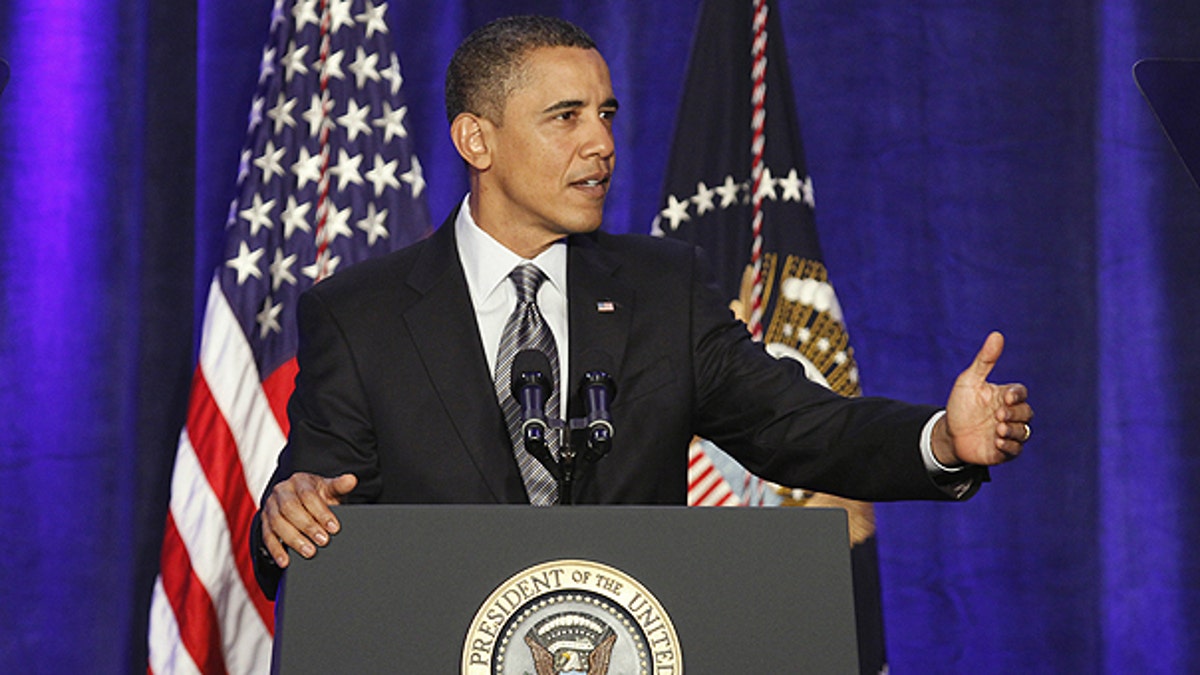
Jan. 28: President Obama speaks at Families USA's 16th annual health action conference in Washington. (AP)
State legislators in Idaho are working to declare President Obama's health-care law "null and void" on the argument that states have the final say when their laws disagree with federal statutes. But critics argue that is a fundamental misunderstanding of the 10th Amendment to the Constitution.
Nullification – the legal theory that says a state can prevent enforcement of federal laws within its borders -- is the latest attempt to block Obama’s health-care law at the state level. And brings with it new controversies and considerable confusion. For example, supporters and opponents of nullification reference the same language in the Constitution.
"I believe that we have sometimes allowed ourselves to think that the federal government is the final say in everything," Republican Idaho state Sen. Monty Pearce, the sponsor of a nullification bill that will be introduced in the Idaho Legislature next week. "The states were the creators of the United States, and as a result they did reserve for themselves the final right. That's what the 10th Amendment is about."
That amendment -- which is part of the Bill of the Rights -- reads, "The powers not delegated to the United States by the Constitution, nor prohibited by it to the States, are reserved to the States respectively, or to the people."
Nullification has been tried before, and the success rate is low. Support for the idea can be traced back to the 1790s. In the 1830s South Carolina Sen. John Calhoun urged its use in response to what he said were unfair tariffs on the South. The issue was resolved through a compromise before President Andrew Jackson carried out his threat to call up the military to enforce the law in South Carolina.
More recently, in the 1950s southern states tried to nullify the Supreme Court's decision to order school desegregation, but the Court ruled states didn't have the authority to ignore the law.
"I think it is fairly clear that a state cannot pass a law that simply nullifies federal law," said Thomas Dupree, a former deputy assistant attorney general in the Bush administration. "The federal law is supreme under our Constitution. If there's a conflict between the federal law and the state law, the federal law prevails."
In fact, Idaho's deputy attorney general released an opinion saying this law won't stand up in court. That’s making other Republicans there think twice about whether or not they can support the bill, despite their ardent desires to see the Obama law overturned.
"My concern is the separation of powers," Idaho Republican state Sen. Curt McKenzie said. "There are ways to address this issue, but this isn't the right path."
McKenzie chairs the legislature’s State Affairs Committee, which will decide whether or not to send the proposed bill to the Senate floor for a final vote. He also happens to be a lawyer and small business owner.
At least six other states are toying with the idea, including Maine, Montana, Oregon, Nebraska, Texas and Wyoming. They may be more inclined to decide one way or the other after the Idaho bill's fate is decided.
Idaho is part of the 26-state federal lawsuit against the federal government led by Florida. A judge ruled Monday in favor of the states, saying Obama's health-care law is unconstitutional. There's a case to be made that Idaho's choice to nullify the bill is largely political.
"I think you need to separate the political consequences from the legal consequences," argues Dupree. "I think it sends a pretty strong signal to Washington that there's a lot of discontent out there among the American people concerning the law. Now whether as a legal matter these state laws are valid and constitutional I think the answer is they are probably not."
Pearce disagrees.
"We think we have a very good chance," he said.




